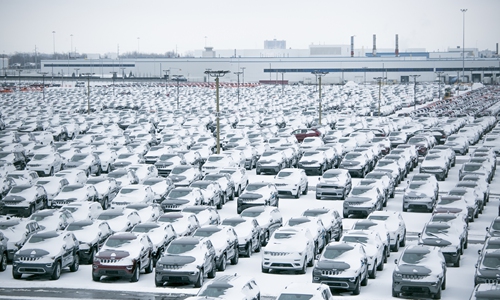HOME >> SOURCE
Trump’s tariff war backfires on US factories
By Chi Jingyi and Zhang Dan Source:Global Times Published: 2019/12/3 21:48:40
PMI falls as Washington takes dispute with China worldwide

A homeless man sits on a steam grate for warmth during freezing temperatures at the 5th Avenue in New York, the US on February 16, 2018. Photo: VCG
The US purchasing manufacturer's index (PMI) declined in November and came in below expectations, while the PMIs of China and the EU rose. Analysts said the figures show that the US is lying in the bed it made when it comes to the impact on trade wars on manufacturing.The US PMI fell for the fourth consecutive month to 48.1, from 48.3 in October and below market expectations of 49.4, the Institute for Supply Management announced on Monday.
A reading above 50 indicates expansion, while a number below 50 falls into the contraction range.
"The US is suffering from the trade wars, not only with China, but with the rest of the world," Tian Yun, vice director of the Beijing Economic Operation Association, told the Global Times on Tuesday.
"Against the backdrop of the persistent trade war and an unsustainable fiscal deficit, a decline in US manufacturing is inevitable," Tian noted.
The deficit for fiscal 2019 was $984 billion, hitting a seven-year high, according to the US Treasury in October.
"Companies are pessimistic about future growth demand in the US, especially given the significant destocking in US manufacturing," Tian said.
While US manufacturing keeps dropping, China's PMI rose to its highest level in almost three years, with a reading of 51.8 in November, according to the Caixin manufacturing PMI on Monday.

Photo:VCG
Zhou Xuezhi, a research fellow at the Institute of World Economics and Politics under the Chinese Academy of Social Sciences, said that China's PMI is rising, indicating that business investment continues to improve and confidence is returning.
Bai Ming, a research fellow at the Chinese Academy of International Trade and Economic Cooperation, told the Global Times that US is "naive and stupid" in aiming to revitalize its manufacturing industry by adopting the "America First" doctrine.
"By starting the trade wars with the world, the US hopes to win market space. However, if it breaks away from the overall structure of the international division of labor, and looks to develop itself by trade protectionism, it will end up locking itself on an island," Bai said. By doing so, US manufacturers cannot take advantage of global resources.
US President Donald Trump's tweet on Tuesday reinstated tariffs on Brazilian and Argentine steel and aluminum. Meanwhile, US Trade Representative Robert Lighthizer announced that he had proposed action to impose additional tariffs on some $2.4 billion worth of French products, as a retaliation for France's digital services tax.
Bai suggested the US should combine its advanced technology with other countries' advantages in manufacturing to develop together, giving the example of Germany's precision instrument manufacturing and China's large-scale processing capacity as "the world's factory."
"Cooperation between China and Europe may have to be strengthened. In the future, there may be a process under which intra-Eurasian trade will continue to increase while trade with the US will decline or even worse, decouple," Tian added.
Tian also predicted that the GDP growth of the US in the fourth quarter will very likely be less than 2 percent, given the trade war background and a consistent decline in the PMI.
Posted in: ECONOMY